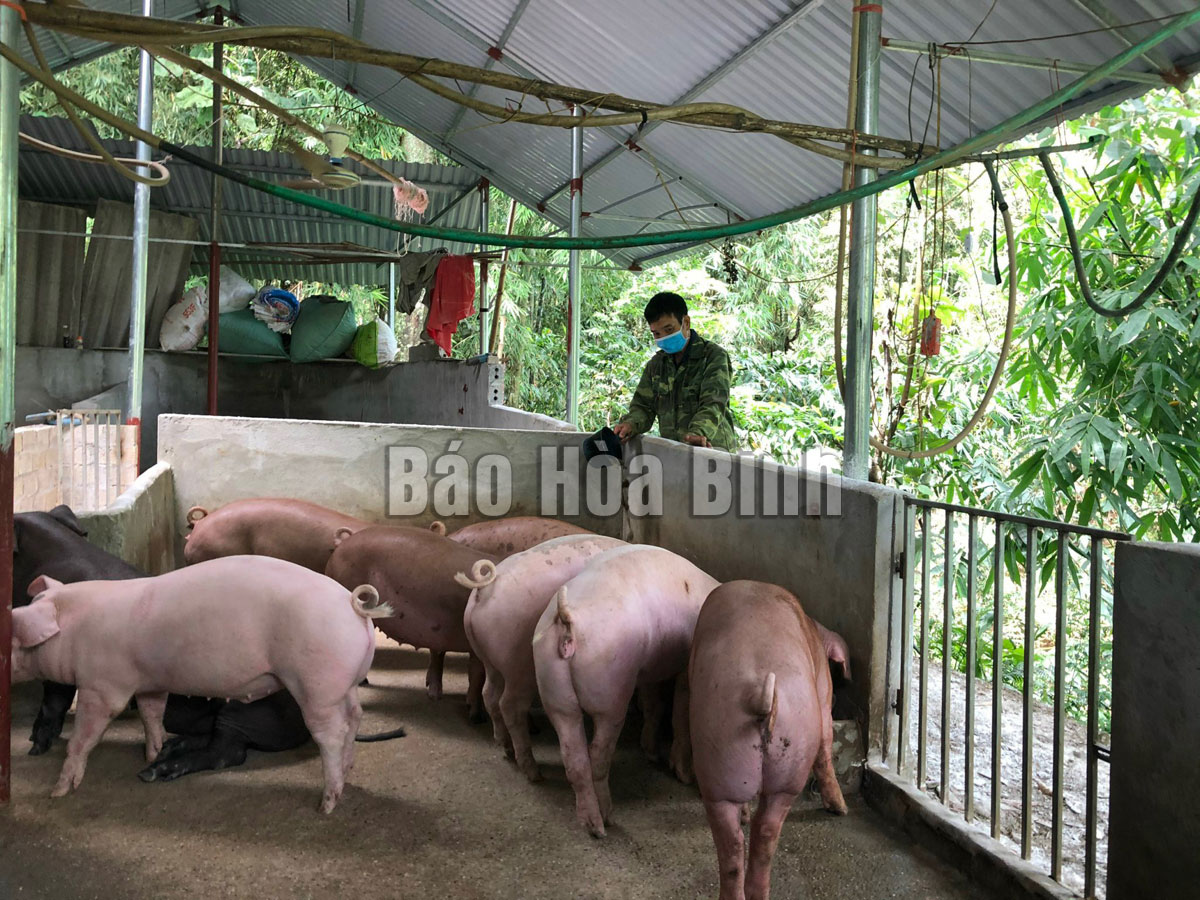
(HBO) – Identifying ethnic minority affairs as an important political task, over the past years, the Party Committee and administration of Kim Boi district have been applying themselves to caring for and improving the living standards of ethnic minority people, through which helping strengthen the great national solidarity, guarantee political security and social order and safety, and enhance the minorities’ trust in the Party and State leadership.
Thanks to livelihood development supporting projects,
farmers in Hung Son commune of Kim Boi district has developed animal husbandry
to improve household earnings.
To help create livelihoods and raise income for
ethnic minority people and build new-style countryside, sectors and specialised
agemcies of Kim Boi district have coordinated to implement several programmes
and projects assisting farmers to develop livelihood models and boost
production connectivity. The district is currently home to 30 cooperatives
operating in agriculture and 17 livestock farms.
In the first half of 2023, 45 classes were
opened to transfer scientific and technical advances in agriculture for more
than 2,000 people, 1,000 local residents given jobs, and 179 projects provided
with loans by the Kim Boi branch of the Vietnam Bank for Social Policies.
Nguyen Manh Hung, Chairman of the Kim Boi
Farmers’ Union, said the unions at all levels in the district has encouraged
farmers, especially those in remote and ethnic minority areas, to practice
organic farming, apply science and technology, restructure crops, and develop
efficient production and business models. The district union has continued
increasing support for members, particularly ethnic minority ones, to form
fruit and vegetable production chains in line with the VietGAP standards, build
brands for produce, and develop products under the One Commune, One Product
(OCOP) programme.
During the first six months, animal farming in
Kim Boi was maintained while animal product prices stable. Thanks to the
fruitful implementation of the policies helping with vocational training and
job creation, a number of ethnic minority people have gained jobs and stable
income.
Meanwhile, socio-economic infrastructure has
gradually been perfected thanks to funding from the district’s budget and
different programmes and projects. During H1, more than 9km of rural roads and
four schools were built. Over 5km of roads, 3km of cannels, eight lakes and
dams, and 28 schools were also repaired and upgraded. Investment procedures
were also carried out to prepare for the building, repair, and upgrade of 13
community houses of local hamlets.
In addition, the policies for reputable persons
in ethnic minority communities and low-income earners, along with those on
human resources training in ethnic minority areas have been promoted and proved
effective, according to Hung.
Bui Quang Hop, deputy head of the district’s
ethnic affairs division, said that generally speaking, the ethnic minority
policies have been implemented as planned and in a transparent manner, thereby
creating conditions for the target group in disadvantaged areas to develop
livelihoods and stabilise their lives./.
More than just an information technology teacher, Bui Van Nien is an inspiring figure who has nurtured the scientific curiosity and creative spirit of students in Vietnam’s ethnic minority communities.
Da Bac is the most disadvantaged mountainous district in Hoa Binh province, with ethnic minorities accounting for about 90% of its population. Over the past years, the district has mobilised resources to implement ethnic policies to improve the quality of life of local people.
In recent years, Hoa Binh province has consistently prioritised the protection, care, and education of children, particularly those from ethnic minorities and disadvantaged backgrounds, by creating a safe, healthy, and nurturing environment for their all-round development.
The Steering Committee for Tobacco Harm Prevention and Control of Hoa Binh province, in coordination with the Tobacco Harm Prevention and Control Fund, held a ceremony on May 28 in response to the World No Tobacco Day (May 31) and the National No Tobacco Week (from May 25 to 31). The event was chaired by Nguyen Van Toan, Standing Vice Chairman of the provincial People’s Committee and head of the Steering Committee.
Since 2021, the Center for Industrial Promotion and Industrial Development Consulting (CIIDC) under the Department of Industry and Trade has been implementing a school lighting model as part of the plan for using energy efficiently and economically in Hoa Binh Province in the pẻiod of 2021 - 2025. This model not only aims to improve the learning conditions and enhance the education quality, but it also promotes the message of energy saving, energy security, environmental protection and contributes to the goals of socio-economic development.
In the 2024 - 2025 school year, the entire Hoa Binh provincial education sector includes 520 educational institutions and schools. Among them are 13 ethnic boarding schools with 153 classes and 4,487 students. Four of these schools have met national standards, reaching 30.7 percent.



